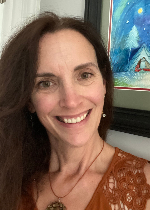By Kerry Irish, LCSW, OSW-C
I was on a beach in Mexico with fellow AOSW member Tara Schapmire and our husbands the first time I heard the word “Coronavirus.” I remember looking down at the beer in my hand a bit nervously and cracking a joke that this wasn’t going to be good for its brand. I didn’t feel terribly concerned, wrapped in my own American brand of privilege and arrogance, that it would amount to much.
Well, we all know how that turned out. Six weeks after that trip, my coworker and I were put on “remote work duty”, part of a contingent of employees whose roles could be adapted to virtual delivery. I remember feeling a mixture of gratitude and unease about this, along with sadness and concern for my oncology social work colleagues across the country who were sharing their experiences on SWON, which varied from being traumatized by what they were witnessing as their institutions were flooded by patients dying from COVD-19 to being deemed “non-essential” (how I hate that term!) and furloughed, to losing their jobs altogether. By July, most of my friends in New York and New England had suffered the loss of at least one loved one to the virus; in my case, my beloved aunt died swiftly after being exposed to it in the skilled nursing facility where she resided.
During the lockdown and especially during the time when we learned about and from the brutal murder of George Floyd, followed by an individual and collective reckoning of how deeply damaged our society is by its racist roots, I (like millions of others) struggled to try to stave off a recurrence of depression, which felt like being caught in an undertow. The pandemic, it seemed to me, was a natural event – something that we know happens approximately every hundred years, and we just happened to be living at a time when it came around again. While frightening, it didn’t give rise to the sense of hopelessness that exposure to the very worst in human nature did for me. I felt a deep sense of personal shame when I realized that this degree of racist violence had always been there – I had simply been shielded from it in my white skin. I was and remain deeply grateful for the generosity that our AOSW members of color demonstrated throughout that period as they shared their perspectives through postings on SWON, personal conversations, a webinar, and work on our diversity, equity and inclusion (DEI) committee.
Through participation on that committee, I learned of member Lisa Petgrave-Nelson’s podcast, “Diary of a Black Social Worker.” An early episode in which she spoke about micro-aggressions that she encounters every day in her workplace further ignited a personal commitment to “know better and do better.” “Knowing better,” of course, requires learning and humility and self-examination. Committing to undertake this work, inspired by our colleagues and by activists marching in the BLM protests, felt like beginning to swim perpendicular to the shore when caught in the riptide of depression.
There are other ways in which my work as an oncology social worker and my membership in AOSW have served as lifebuoys over this past 20 months. Maintaining a connection to colleagues through SWON, through board and committee work, and through the Collegial Comfort initiative (which has recently re-launched as “Tuesday Timeouts” under the auspices of our Spirituality SIG) has been a ballast against isolation and despair, particularly the “humans are behaving terribly” brand of despair. Witnessing the dedication, compassion, courage and resilience of both patients and colleagues alike serves as a steady reminder of that which is best within humans. Relying upon the teachings and contemplative practices that are part of my spiritual path’s tradition have helped to ground me when fear and sadness threaten to overwhelm me. Cultivating gratitude for the countless blessings in my life—-including the gifts of work that I love and involvement in this beloved AOSW community—-has helped to keep the shoreline in sight.

